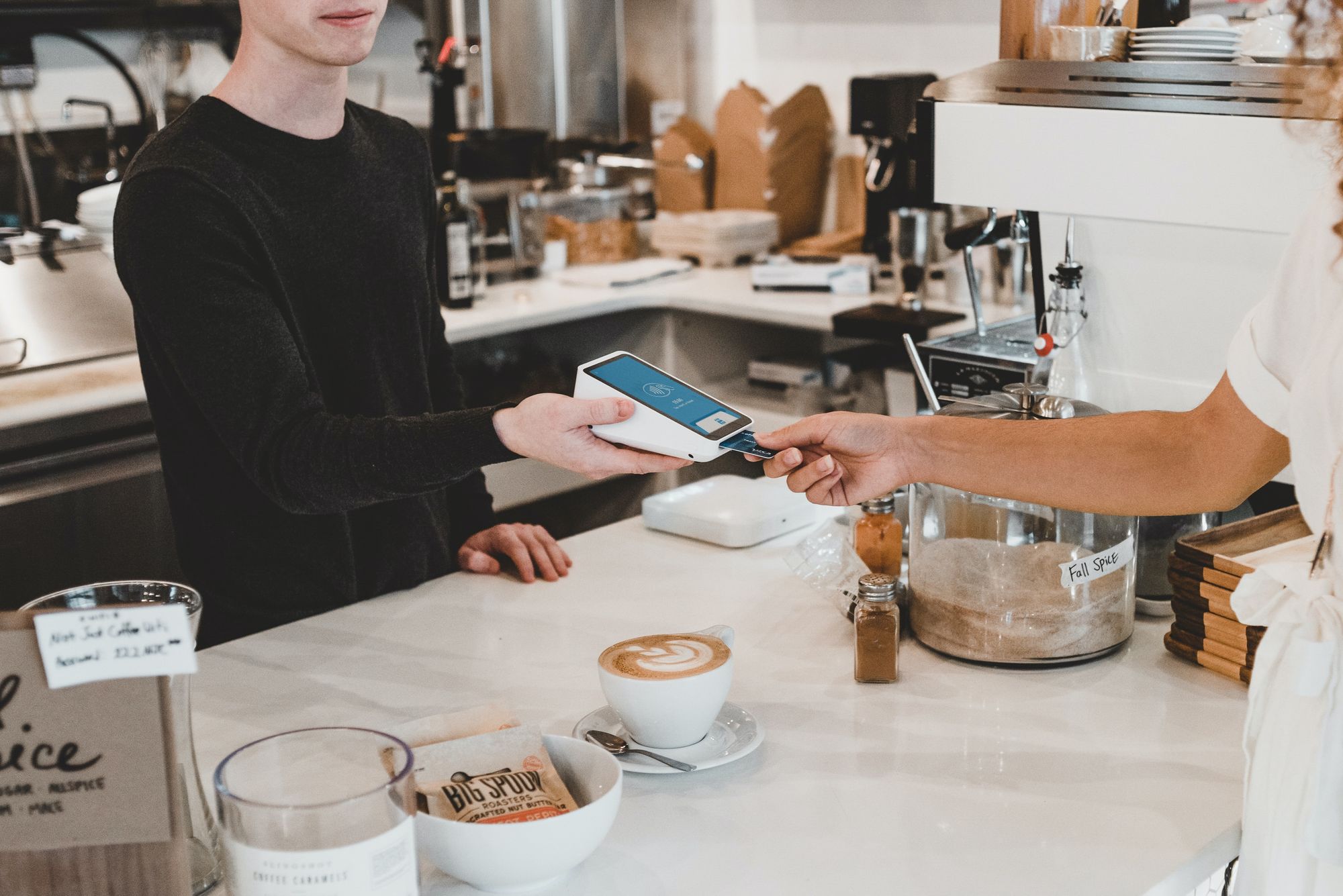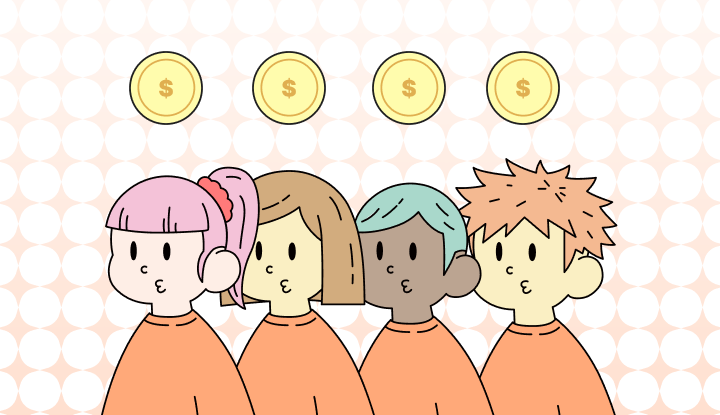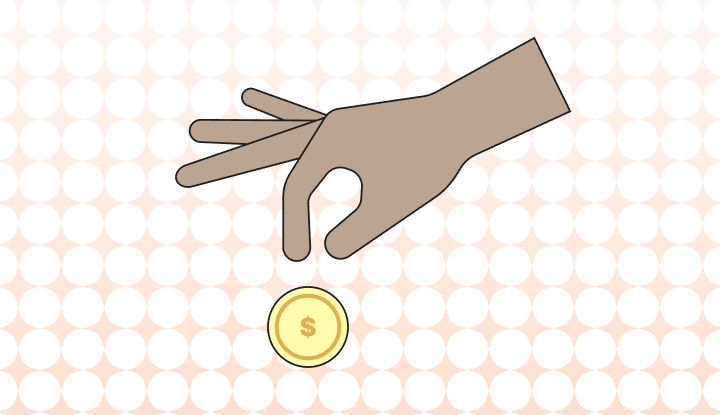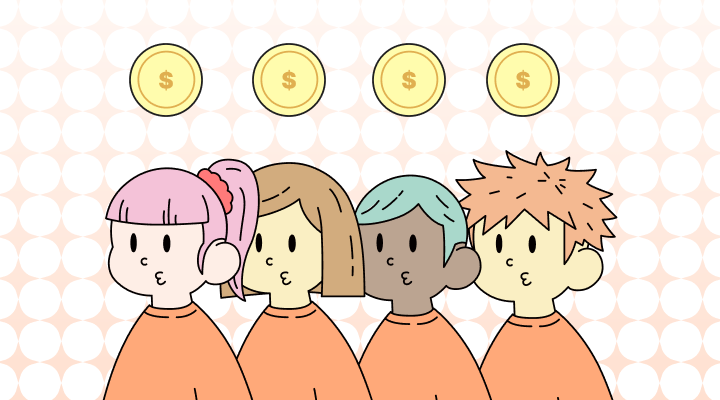お友達と一緒にご飯を食べてお会計する時、使える表現です。
A. It’s on me. (私の奢りです。)
B. Let’s split the bill (割り勘にしましょう。)

A. It’s on me. (私の奢りです。)
友達や恋人と食事をして、時々ありがたいことがあったり、私の方から招待した時に自分から奢りたいことがあります。この時使う表現が ‘It’s on me!’です。
同じ意味で使える表現としては、'I'll pick up the tab.'や'It's my treat.'もあります。
その他にも、'It's on me'ではなく、'It's on the house'と言うと、食堂でサービスとして食べ物やドリンクを出す時に使う表現です。
まとめ
私の奢りです。
- It's on me.
- I'll pick up the tab (check).
- It's my treat.
店の奢りです・サービスです。
- It's on the house.
例文:
- Don't worry about the bill, everyone. It's on me this time. (皆さん、お会計のことは心配しないでください。 今回は私のおごりです。)
- She was so grateful for her friend's help in moving to her new apartment that she said, 'Lunch is on me as a thank-you for all your assistance.' (彼女は新しいアパートへの引っ越しを手伝ってくれた友達にとても感謝していたので、「あなたのすべての援助に対するお礼として昼食は私の奢りです」て言った。)
- After winning the bet, he graciously exclaimed, 'Drinks are my treat!' (宝くじ当たて,彼は嬉しく’ドリンクは私の奢りです!’て叫んだ。)
- The restaurant manager, wanting to apologize for the mix-up with the order, told the diners, 'Please accept our sincere apologies, and your desserts are on the house tonight.’ (レストランの店長は、注文が入り乱れてしまったことについて謝罪したいと思い、お客様たちに「心からお詫び申し上げます。デザートは店の奢りです。」と言った。)
B. Let's split the bill (割り勘にしましょう。)
billは名詞で「レシート」、splitは動詞で「分ける、分割する」という意味があり、「split the bill」はつまり「割り勘でする」という意味です。
また、同じ意味で「go dutch」という表現を使うこともできます。 Dutchは本来オランダ人という意味を持っていますが、では「go dutch」もオランダ人の特徴から来た表現なのでしょうか?
それは違います。 この表現は19世紀のアメリカで、いわゆるPensylvania Dutchと呼ばれていたドイツとスイスの人々が集まりに自分が食べる食べ物を持ってきた慣習から来たそうです。
まとめ
割り勘にしましょう。
- Let’s split the bill.
- Let’s go dutch.
例文:
- After a great dinner at the new restaurant, Sarah and John decided to split the bill evenly. (新しいレストランで素晴らしい食事をした後で、サラとジョンは割り勘で払うことにした。)
- At the end of the meal, the group of friends agreed to split the bill to make it easier for everyone to pay their fair share. (食事の最後に皆んなは公平に払えるために割り勘にすることにした。)
- At the coffee shop, the friends always preferred to go Dutch. (カフェーで彼らはいつも割り勘でするのを好みます。)
ネイティブに近い英語が使いたくなったら、AI英作文チェッカーのEngramをお試しください。Engramは、独自のAIが文法エラーとぎこちない表現を自然かつ洗練に校正します。
無料英文チェッカー / 英語校正 - Engram
Engramの無料英文チェッカーと英文校正ツールを使用して、翻訳機の物足りない結果を校正・添削してみましょう。 文法、正書法の誤りとあいまいな英語表現をAIが自然に校正します。

参考資料:
더치페이 영어로 (Go Dutch, Split the Bill)
‘더치페이‘는 영어로 go Dutch나 split the bill 등으로 표현합니다.‘나눠서 돈을 내자’가 영어로도 ‘Let’s Dutch pay’가 되진 않습니다.그렇다면 영어로 이를 말하고자할 때는 어떻게 하는 것이 맞는지 함께 알아봅시다.

지불하다 영어로 (Pay the bill, Make a payment, Settle the payment, Cover the cost, Pay in cash, Pay off a debt 차이)
″지불하다”를 영어로하면 “Pay the bill”, “Make a payment”, “Settle the payment”, “Cover the cost”, “Pay in cash”, “Pay off a debt”라는 다양하게 표현됩니다. 각 표현은 지불과 관련된 상황에서 자주 사용되며, 예시 문장들은 그 사용법을 보여줍니다.














